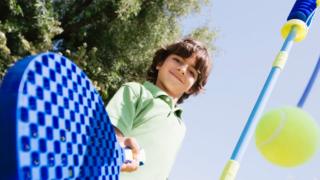Coronavirus: The toys and games that saved lockdown
 Image copyright Getty Images
Image copyright Getty Images Stuck at home, irritable, and a little bit bored during lockdown – and that’s just the parents. Many have felt the need to buy big Lego sets and 1,000-piece jigsaw puzzles to keep themselves entertained.
Their children, on the other hand, have had a whale of a time playing outside in the glorious weather.
Retro stationary tennis game Swingball has bounced into the top 10 toy bestsellers during the coronavirus restrictions.
While many families do not have the luxury of outdoor space at home, one psychologist says the experience of playing games together may be one good outcome from the national crisis.
Bored of board games?
Lockdown has proved to be a mixed blessing for the UK toy sector.
Toy retailers, like the rest of the High Street, have been shut and struggling. Gary Grant, boss of one of the biggest toy sellers in the UK, The Entertainer, says that the business would have folded without the government’s financial support, and is still fighting for survival.
Yet the value of UK toy sales rose by 17% in the two months from the beginning of lockdown compared with the same period last year, according to analysts NPD.
That’s because parents and children in the UK have actually been buying fewer toys, but spending more on those they have bought during lockdown.
The average amount spent on a toy or game has risen from £8.07 to £9.65, NPD data shows.
Initially, the big sellers were games and puzzles «to keep the kids occupied while parents were working», according to Frederique Tutt, global toy industry expert at NPD. They remain the biggest success story, with sales up 43% in value in the first half of this year compared with the first six months of 2019.
Monopoly and Dobble are among the 10 biggest-selling toys and games during lockdown.
Then the month of May – the sunniest calendar month on record in the UK – prompted demand for outdoor toys, which recorded a 31% increase over the same period.
Sand and waterslides flew off the virtual shelves.
It was a different story in continental Europe where, despite similarly good weather, tighter restrictions and less of an online market meant parents saved their toy spending until the shops reopened.
In the UK, children – unable to visit the toy shop – have kept their pocket money tucked away too. The amount spent on collectable toys, the big hit of recent years, has collapsed by nearly a third (29%) since the start of the year.
Impulse buying evaporated, and that was bad news for Gary Grant, long-time advocate of the physical toy shop. Even the sale of 300 tonnes of play sand in eight weeks could not make up for lost revenue.
He describes the last three months as «traumatic». The vast majority of his 2,000 members of staff have been furloughed and he had to overhaul the business’s online operation and warehouses within days.
All attention is now on the shops reopening in England on Monday and later in other parts of the UK, and making them a safe place to visit.
«We want children to run around our shops. They are toy shops. But at the moment, they can’t, because it has to be safe for customers and staff,» he says.
Reopening has to work for the future of town centres, he says. The government lifelines of providing state-paid wages, business rate breaks, and support loans will end eventually.
«We cannot afford to have a second wave [of the virus],» he says. «We might not survive that.»
For now, he is appealing to the public to visit shops again, but sensibly.
«Do not turn your back on the High Street, otherwise the High Street will be dead. Retailers like the food shops stepped up [during lockdown], we need to back them up,» he says.
The analysts’ predictions will not all make happy reading for him.
Consumer surveys by NPD suggest shoppers are cautious about heading back to stores. Four out of five of those asked said they would research toys online before buying them. Click and collect, free delivery, and in-store fast lanes at tills are all high on consumers’ wish lists.
The silver lining for shops is that, despite the inevitable economic pain ahead, Christmas in the toy sector has usually been resilient to stretched household budgets.
The last thing to sacrifice, it seems, is the kids’ presents, especially when grandparents are able to step in to help pay for them.
Quality time
The sector can also comfort itself in the knowledge that, according to one psychologist, play has helped families get through the anxieties created by the coronavirus outbreak.
«Playing is a great distraction, and families communicate better when they are doing something together,» says Dr Amanda Gummer, founder of the Good Play Guide.
She says that there are inequalities over space at home, and how much money can be spent, but play is a great leveller.
«You can still make a great den with pillows and a duvet,» she says.
The long-term effects of lockdown may also be positive.
Children have had to learn about boredom and how to entertain themselves, to know when to be energetic or quiet, she says.
That might not mirror every parent’s experience, but she says they too may have recognised the benefits of a slower pace of life, taking time to smell the roses or do a scavenger hunt with their children.
If all that fails, they could just go back to that unfinished jigsaw.

